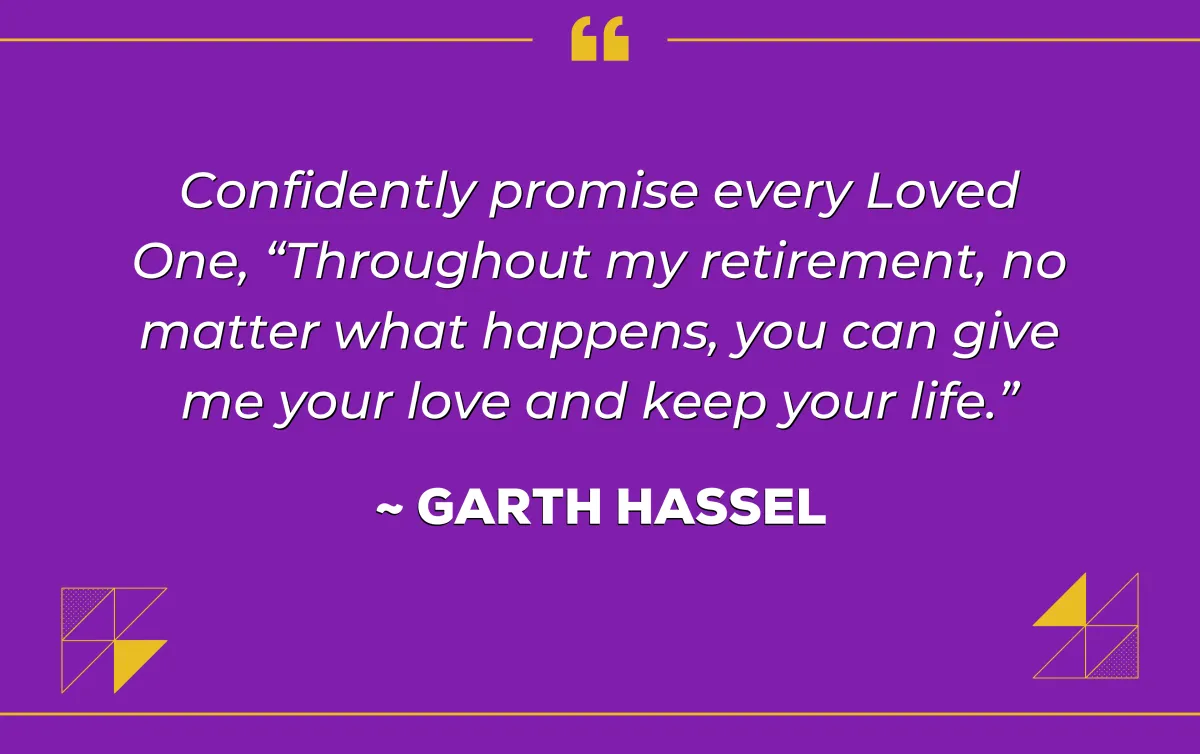





Description
You know you need to plan your retirement. And your estate.
How about your quality of life?
And when you’re most vulnerable your dignity?
That is, what’s your endgame?
How do you pull it all together and keep it together now to beyond your last breath? Your way, always?
Perhaps you’re already a caregiver to your aging parents. Perhaps you are an aging parent. Perhaps you’re both, or worried you will be. You know too many people stuck in arduous situations with family drama, angst, and financial drain.
Keep Your Life is a timeless path to follow so from your first day of retirement, you can assure your kids and closest Loved Ones that they can give you their love and keep their lives.
Keep Your Life is how to surf the silver tsunami without drowning. It’s confidence to:
▸ maintain harmony within your family
▸ avoid becoming a victim of elder abuse
▸ find advisers that match your personal and financial styles
▸ prepare for the possibility of needing long-term care
▸ reduce stress by making the tough decisions before they become crises
▸ reduce your financial risks
▸ avoid the 7 epic errors that millions of people suffer
~ in their relationships with Loved Ones and,
~ in their relationships with money.
Online resources help you make real progress toward planning your endgame.
If you are serious about achieving that progress, you can complete an online assessment after finishing the book. Then the author offers you (until he has more demand than he can handle) a personal action plan that points you in the right direction*.
* The personal action plan is not legal, tax, investment, or insurance advice.
Description
You know you need to plan your retirement. And your estate.
How about your quality of life?
And when you’re most vulnerable, your dignity?
That is, what’s your endgame?
How do you pull it all together and keep it together now to beyond your last breath? Your way, always?
Perhaps you’re already a caregiver to your aging parents. Perhaps you are an aging parent. Perhaps you’re both, or worried you will be. You know too many people stuck in arduous situations with family drama, angst, and financial drain.
Keep Your Life is a timeless path to follow so from your first day of retirement, you can assure your kids and closest Loved Ones that they can give you their love and keep their lives.
Keep Your Life is how to surf the silver tsunami without drowning. It’s confidence to:
▸ maintain harmony within your family
▸ avoid becoming a victim of elder abuse
▸ find advisers that match your personal and financial styles
▸ prepare for the possibility of needing long-term care
▸ reduce stress by making the tough decisions before they become crises
▸ reduce your financial risks
▸ avoid the 7 epic errors that millions of people suffer
~ in their relationships with Loved Ones and,
~ in their relationships with money.
Online resources help you make real progress toward planning your endgame.
If you are serious about achieving that progress, you can complete an online assessment after finishing the book. Then the author offers you (until he has more demand than he can handle) a personal action plan that points you in the right direction*.
* The personal action plan is not legal, tax, investment, or insurance advice.
Excerpt from Chapter 4: Schmuck, Esq.
Quick, Easy, and Agonizing
Harry’s casket silently descends into the pit as rain pelts the canopy, drowning all sounds of grief. Joe’s throat tightens as Gloria’s weeping crescendos to convulsive sobbing. Roberta embraces her mom’s quaking frame. Joe stands behind Roberta and Gloria, hands on their shoulders. The Greatest Generation loses another hero.
The vacuum of Harry’s loss to Roberta and his mother-in-law sucks confidence from Joe. Gloria’s grief will have her leaning on her daughter. As the only man in Gloria’s life, Joe’s role just acquired a new dimension, though he never had to face the Great Depression or the horrors of a world war. He and Roberta stood on the shoulders of bedrock couples like Gloria and Harry, who had neither uttered complaints of deprivation during the Great Depression and their first years of marriage nor boasted of his deeds behind the Silver Star in their box of mementos.
Roberta teaches third graders and Joe designs highways with cloverleaf interchanges. Joe and Harry always got along, limiting most conversations to the tangible things of life. Harry’s matter-of-fact manner suited Joe’s columns-and-rows way of thinking.
Joe presumes that Harry left Gloria in good shape financially, but he’ll have to find out. Gloria never delved into those things. Even though she had riveted bomb casings during the war, when Harry returned in one piece from the beaches of Normandy, Gloria happily hung up the coveralls for her hand-sewn kitchen aprons.
Roberta helps her mom probate Harry’s estate. Because he left everything to Gloria, probate is simple. They wisely check in with their accountant, who files the final tax return.
With Harry gone, Joe knows that Gloria needs to update her important documents. One trait that Joe picked up from Harry early on was frugality. “I’ll make you proud, Harry,” thinks Joe. Speaking into the ceiling of his den, he says, “When you had your will done back in the day, you had to pay an attorney, who had to pay his assistant to type everything up. I remember you saying it cost you a couple of weeks’ wages to get all those documents. Nowadays, any intelligent person can bypass schmucks who charge ridiculous fees for boilerplate forms. Especially with the internet. Heck, Roberta and Gloria sailed through probate without needing an attorney. Gloria’s still sharp enough to sign before a notary. We’ll get this done and be ready before Gloria starts to lose it. I’ll take care of it, Harry. I got this.”
Joe hops online, answers basic questions, and downloads Gloria’s new “estate plan.” He takes Roberta and Gloria to their bank to get Gloria’s signatures notarized, then off to Chick-fil-A for lunch. Joe’s treat. He’s feeling pretty good about himself.

No Compromise
Not a year passes when Gloria has a stroke. Dr. Garland looks at Roberta and Joe as they sit on either side of Gloria’s bed holding her hands, hoping Gloria will squeeze just a little. “Brain scan isn’t pretty. She might not get her motor skills back on her right side. And we’re probably looking at moderate to severe aphasia, meaning she loses her ability to process language. Therapy will help, but there’s no telling how much. It’ll be a slow recovery.”
And slow it is. Gloria’s rehab is only moderate by the time she burns through the Medicare limits. Roberta and Joe must decide what to do next. Gloria still can’t take care of herself. Dr. Garland’s plan of care doesn’t require skilled nursing but does specify an enhanced level of assisted living or personal care, as it’s normally called in their state.
Time is short to shop around. Roberta narrows it down to one place where she feels Gloria will warm to the ambiance and get the best care. Joe tries not to choke in front of Roberta, looking at $6200/month. Joe feebly campaigns for what he figures is a comparable facility and care at $5600/month, but he knows better than to whip out a spreadsheet. Roberta won’t compromise on Mom’s care. They write the check from their own account to get her moved in right away. They’ll circle back to Gloria’s accounts later.
A Dollar Saved Is a Hole in
Your Pocket
Harry left Gloria with about $300,000 and his Social Security check of $2600/month. They could sell Gloria and Harry’s cozy condo for $100,000. They’d end up with roughly $400,000 to make up the difference from Social Security. After considering Gloria’s Medicare and Medicare Supplement premiums and other expenses, they determine the draw on that $400,000 would be about $4600/month.
Dr. Garland has warned that within a year or two Gloria might need to be transferred to skilled nursing. Roberta can’t think about that now. Joe makes a few calls, which all sound about the same. “What do you mean skilled nursing starts at $10K per month?”
“Everyone wants to live and die at home,” Joe mutters. He looks into getting skilled help at their house. It costs more, and that’s before remodeling to make it workable.
Joe wrestles with perceiving Gloria as a hole in that $400K bucket. “That’s so wrong!” he tells himself. But the thoughts persist. He and Roberta resign themselves that Roberta’s inheritance is not a concern compared to Gloria’s well-being in her final years. She earned it, and Harry would want it that way.
The Face of Expenses
Roberta storms through the door. “Joseph! Your document you had mom sign is no good!”
“What are you talking about?” Joe shoots back. His mind races as he reminds himself, I’m mister columns and rows, dot the i’s cross the t’s. I design roads that support 80,000-pound semis barreling along at 80 mph. I’m sure I didn’t miss something!
“My Power of Attorney for mom’s finances. Mom’s bank won’t accept it. They only accept their own POA form!” Roberta exclaims, her voice still shrill.

Defeated, Joe and Roberta meet with Kristen, an elder law attorney. Kristen explains, “I could have escalated your case with the bank’s management if you had a properly drafted POA, but not with the short form you downloaded. Even though you had it notarized at the bank, notaries only verify signatures. They don’t examine what the document says. As a matter of good practice, I have my clients test their newly drafted POAs with the grantor’s—for you, Gloria’s—financial institutions to make sure they’ll be accepted. Sometimes they insist on their own form, in which case I review them for unfavorable clauses. It’s a lot easier to fix a problem before it becomes urgent. In your case, it’s too late to redo forms.”
Reinforcing her point, she explains, “A couple came to me when their downloaded POA that was missing two letters—UN—cost them their parents’ house! It was a Medicaid case, so more complicated than your situation. But had they come to me proactively, that house would still be in the family.”
Kristen petitions the court to have Joe and Roberta granted co-guardianship / conservatorship over Gloria and her assets. Meanwhile, Joe and Roberta have to cough up the funds to cover Gloria’s care for the months it takes for the court to finally grant the guardianship. Ouch!
Experience Isn’t Logical
In the course of this ordeal, Kristen tactfully educates Joe and Roberta that law isn’t based on logic; it’s based on experience. The stunning couple also learn that their state has inheritance taxes for non-spouse beneficiaries. Joe’s assumption—that since Gloria owed no inheritance taxes, Roberta wouldn’t need to worry about them at Gloria’s passing—was flat out wrong. And that inheritance taxes are different from estate taxes—their state has no estate taxes, but it does have inheritance taxes!
Joe acquiesces to Roberta’s insistence that Kristen helps them get their own affairs “done right.”
“So,” says Roberta half playfully and half-seriously to Joe, “how much time and money did you save by downloading those forms from the almighty internet?”
Joe glares back. “Shut . . . ” He looks down, then says, “Shoot . . . Let’s go to Chick-fil-A.”
Do-It-Yourself resources are fine for increasing your awareness, but let’s face it: no algorithm or set of canned questions can capture the nuances of your unique situation—what do you think? If you allocate the additional time to research the issues, then expect that effort to merely expand your list of questions. Every professional appreciates clients who’ve done some homework. Nobody has lived through retirement twice, let alone dementia or Alzheimer’s. Realistic expectations get you on the same page quickly. Yet the daunting discomfort of the topic of estate planning dissuades most from ever committing that time.
What if the few hours you spent answering the questions in this book and re-examining your own endgame would vanquish that discomfort?
What if you gained the clarity and the confidence to commit to a custom action plan?
Our next case is a series of breakdowns from good intentions with no legal backing.
Excerpt from Chapter 4: Schmuck, Esq.
Quick, Easy, and Agonizing
Harry’s casket silently descends into the pit as rain pelts the canopy, drowning all sounds of grief. Joe’s throat tightens as Gloria’s weeping crescendos to convulsive sobbing. Roberta embraces her mom’s quaking frame. Joe stands behind Roberta and Gloria, hands on their shoulders. The Greatest Generation loses another hero.
The vacuum of Harry’s loss to Roberta and his mother-in-law sucks confidence from Joe. Gloria’s grief will have her leaning on her daughter. As the only man in Gloria’s life, Joe’s role just acquired a new dimension, though he never had to face a Great Depression or the horrors of a world war. He and Roberta stood on the shoulders of bedrock couples like Gloria and Harry, who had neither uttered complaints of deprivation during the Great Depression and their first years of marriage nor boasted of his deeds behind the Silver Star in their box of mementos.
Roberta teaches third graders and Joe designs highways with cloverleaf interchanges. Joe and Harry always got along, limiting most conversations to the tangible things of life. Harry’s matter-of-fact manner suited Joe’s columns-and-rows way of thinking.
Joe presumes that Harry left Gloria in good shape financially, but he’ll have to find out. Gloria never delved into those things. Even though she had riveted bomb casings during the war, when Harry returned in one piece from the beaches of Normandy, Gloria happily hung up the coveralls for her hand-sewn kitchen aprons.
Roberta helps her mom probate Harry’s estate. Because he left everything to Gloria, probate is simple. They wisely check in with their accountant, who files the final tax return.
With Harry gone, Joe knows that Gloria needs to update her important documents. One trait that Joe picked up from Harry early on was frugality. “I’ll make you proud, Harry,” thinks Joe. Speaking into the ceiling of his den, he says, “When you had your will done back in the day, you had to pay an attorney, who had to pay his assistant to type everything up. I remember you saying it cost you a couple of weeks’ wages to get all those documents. Nowadays, any intelligent person can bypass schmucks who charge ridiculous fees for boilerplate forms. Especially with the internet. Heck, Roberta and Gloria sailed through probate without needing an attorney. Gloria’s still sharp enough to sign before a notary. We’ll get this done and be ready before Gloria starts to lose it. I’ll take care of it, Harry. I got this.”
Joe hops online, answers basic questions, and downloads Gloria’s new “estate plan.” He takes Roberta and Gloria to their bank to get Gloria’s signatures notarized, then off to Chick-fil-A for lunch. Joe’s treat. He’s feeling pretty good about himself.

No Compromise
Not a year passes when Gloria has a stroke. Dr. Garland looks at Roberta and Joe as they sit on either side of Gloria’s bed holding her hands, hoping Gloria will squeeze just a little. “Brain scan isn’t pretty. She might not get her motor skills back on her right side. And we’re probably looking at moderate to severe aphasia, meaning she loses her ability to process language. Therapy will help, but there’s no telling how much. It’ll be a slow recovery.”
And slow it is. Gloria’s rehab is only moderate by the time she burns through the Medicare limits. Roberta and Joe must decide what to do next. Gloria still can’t take care of herself. Dr. Garland’s plan of care doesn’t require skilled nursing but does specify an enhanced level of assisted living or personal care, as it’s normally called in their state.
Time is short to shop around. Roberta narrows it down to one place where she feels Gloria will warm to the ambiance and get the best care. Joe tries not to choke in front of Roberta, looking at $6200/month. Joe feebly campaigns for what he figures is a comparable facility and care at $5600/month, but he knows better than to whip out a spreadsheet. Roberta won’t compromise on Mom’s care. They write the check from their own account to get her moved in right away. They’ll circle back to Gloria’s accounts later.
A Dollar Saved Is a Hole in
Your Pocket
Harry left Gloria with about $300,000 and his Social Security check of $2600/month. They could sell Gloria and Harry’s cozy condo for $100,000. They’d end up with roughly $400,000 to make up the difference from Social Security. After considering Gloria’s Medicare and Medicare Supplement premiums and other expenses, they determine the draw on that $400,000 would be about $4600/month.
Dr. Garland has warned that within a year or two Gloria might need to be transferred to skilled nursing. Roberta can’t think about that now. Joe makes a few calls, which all sound about the same. “What do you mean skilled nursing starts at $10K per month?”
“Everyone wants to live and die at home,” Joe mutters. He looks into getting skilled help at their house. It costs more, and that’s before remodeling to make it workable.
Joe wrestles with perceiving Gloria as a hole in that $400K bucket. “That’s so wrong!” he tells himself. But the thoughts persist. He and Roberta resign themselves that Roberta’s inheritance is not a concern compared to Gloria’s well-being in her final years. She earned it, and Harry would want it that way.
The Face of Expenses
Roberta storms through the door. “Joseph! Your document you had mom sign is no good!”
“What are you talking about?” Joe shoots back. His mind races as he reminds himself, I’m mister columns and rows, dot the i’s cross the t’s. I design roads that support 80,000-pound semis barreling along at 80 mph. I’m sure I didn’t miss something!
“My Power of Attorney for mom’s finances. Mom’s bank won’t accept it. They only accept their own POA form!” Roberta exclaims, her voice still shrill.

Defeated, Joe and Roberta meet with Kristen, an elder law attorney. Kristen explains, “I could have escalated your case with the bank’s management if you had a properly drafted POA, but not with the short form you downloaded. Even though you had it notarized at the bank, notaries only verify signatures. They don’t examine what the document says. As a matter of good practice, I have my clients test their newly drafted POAs with the grantor’s—for you, Gloria’s—financial institutions to make sure they’ll be accepted. Sometimes they insist on their own form, in which case I review them for unfavorable clauses. It’s a lot easier to fix a problem before it becomes urgent. In your case, it’s too late to redo forms.”
Reinforcing her point, she explains, “A couple came to me when their downloaded POA that was missing two letters—UN—cost them their parents’ house! It was a Medicaid case, so more complicated than your situation. But had they come to me proactively, that house would still be in the family.”
Kristen petitions the court to have Joe and Roberta granted co-guardianship / conservatorship over Gloria and her assets. Meanwhile, Joe and Roberta have to cough up the funds to cover Gloria’s care for the months it takes for the court to finally grant the guardianship. Ouch!
Experience Isn’t Logical
In the course of this ordeal, Kristen tactfully educates Joe and Roberta that law isn’t based on logic; it’s based on experience. The stunned couple also learn that their state has inheritance taxes for non-spouse beneficiaries. Joe’s assumption—that since Gloria owed no inheritance taxes, Roberta wouldn’t need to worry about them at Gloria’s passing—was flat out wrong. And that inheritance taxes are different from estate taxes—their state has no estate taxes, but it does have inheritance taxes!
Joe acquiesces to Roberta’s insistence that Kristen help them get their own affairs “done right.”
“So,” says Roberta half playfully and half-seriously to Joe, “how much time and money did you save by downloading those forms from the almighty internet?”
Joe glares back. “Shut . . . ” He looks down, then says, “Shoot . . . Let’s go to Chick-fil-A.”
Do-It-Yourself resources are fine for increasing your awareness, but let’s face it: no algorithm or set of canned questions can capture the nuances of your unique situation—what do you think? If you allocate the additional time to research the issues, then expect that effort to merely expand your list of questions. Every professional appreciates clients who’ve done some homework. Nobody has lived through retirement twice, let alone dementia or Alzheimer’s. Realistic expectations get you on the same page quickly. Yet the daunting discomfort of the topic of estate planning dissuades most from ever committing that time.
What if the few hours you spent answering the questions in this book and re-examining your own endgame would vanquish that discomfort?
What if you gained the clarity and the confidence to commit to a custom action plan?
Our next case is a series of breakdowns from good intentions with no legal backing.




